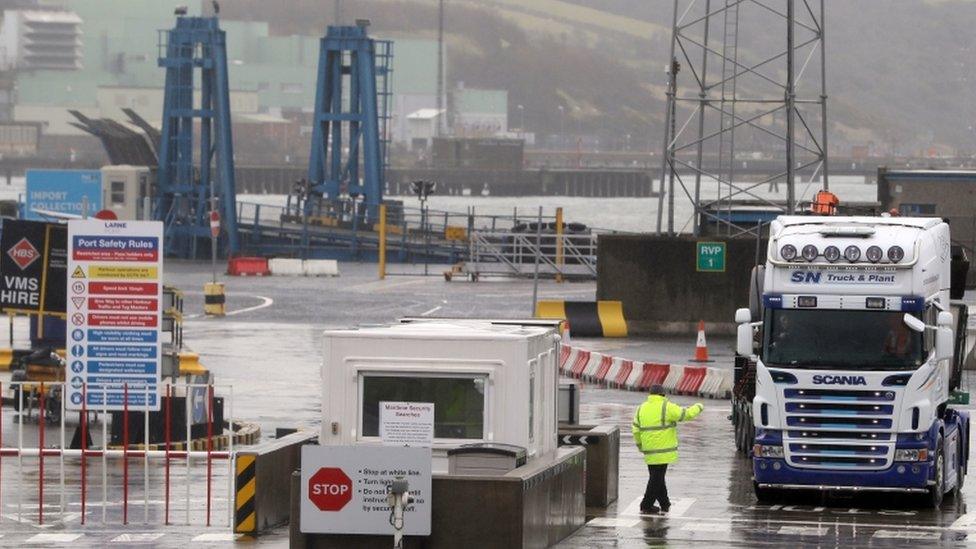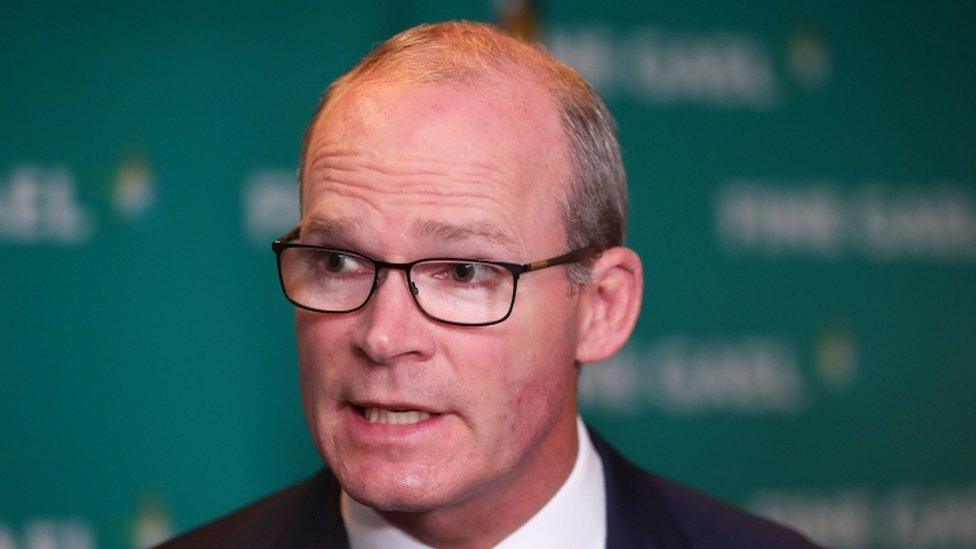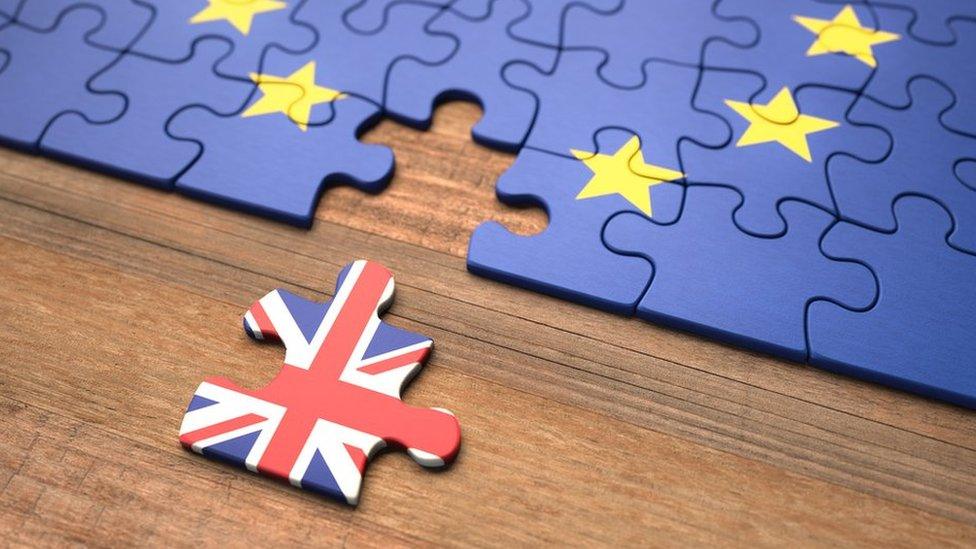Brexit: Stormont leaders at odds over UK-EU protocol row
- Published

The UK has said it will unilaterally extend grace periods for Irish Sea border checks
DUP leader Arlene Foster has accused the Irish government of "ignoring" unionist concerns over the NI Protocol.
It comes after Irish Foreign Minister Simon Coveney said the EU could not trust the UK in post-Brexit talks.
On Wednesday, Number 10 said it would unilaterally extend grace periods for Irish Sea border checks, a move the EU said was a breach of international law.
But Sinn Féin Vice-President Michelle O'Neill said it was the British government "acting in bad faith".
UK Prime Minister Boris Johnson said the problems were technical and could be solved.
The grace periods mean procedures and checks are not yet fully applied.
Northern Ireland has remained a part of the EU's single market for goods so products arriving from GB undergo EU import procedures.
The first of these periods will expire at the end of March, but the UK has said it will be extended until October.
Earlier, Mr Coveney said progress was being made on the protocol and the timing of the UK's move could not be worse.
But Mrs Foster, Northern Ireland's first minister, told a news conference that the British government had a commitment to protect the UK's internal market.
"It was clear last week that the European Commission was not listening to what was going on in Northern Ireland, there was a need to act," she added.
"I have to say Simon Coveney should reflect on his comments, he's not listening to the unionist people of Northern Ireland, he's ignoring them, hoping we'll go away - well we'll not go away."
'Wrong side of public opinion'
She said the British government had indicated a "step-change" in its approach to dealing with the protocol, but that the DUP would continue to press for an alternative to be drawn up.
But Ms O'Neill, Stormont's Deputy First Minister and Mrs Foster's power-sharing partner, said the British government had shown it was "not true to their word when it comes to negotiations".
"In this case I believe they're on the wrong side of public opinion and international law," she added.
"The action was completely unnecessary, what the British government has done is another solo run."
She said she believed negotiations on resolving protocol issues should continue through the UK-EU joint committee, which is scheduled to meet again before the end of March.

Simon Coveney said progress was being made over the Northern Ireland Protocol
However, speaking during a visit to Middlesbrough, the prime minister said: "We're taking some temporary technical measures to ensure there are no barriers in the Irish Sea, to make sure things flow freely from GB to NI and that's what you'd expect.
"I'm sure that with a bit of goodwill and common sense all these technical problems are eminently solvable."
EU delays vote on Brexit trade deal
Later, Northern Ireland Secretary Brandon Lewis said it was about "doing the right thing for consumers and businesses" in NI.
"Sadly the EU hasn't been able to work on a timeframe that works for the supply lines of, for example supermarkets, so we had to make a decision to ensure that we could see a continued flow of products and that supermarkets' supply lines could continue to flow," he said.
"If we'd have left it any longer we'd have had a risk for businesses and livelihoods of people in just a few weeks time.
The European Parliament has declined to set a date for its vote on the EU-UK trade deal in protest at what the EU sees as the UK's unilateral changes.
EU parliament group chiefs had been expected to set a date this month for its vote at a meeting on Thursday.
Mr Coveney's party leader Leo Varadkar, who is Ireland's tánaiste (deputy prime minister), said the UK's actions were neither the way a friend, nor "a respectable, honourable country", should behave.
'Within the UK's remit'
DUP MP Sir Jeffrey Donaldson said the EU's recent move to trigger Article 16 showed "very clearly that it remains within their remit to take unilateral action to protect the EU's single market".
"Under the Northern Ireland Protocol, the UK Government has the same power - to act unilaterally to protect the integrity of the UK internal market and trade between Northern Ireland and Great Britain," he told the BBC's Good Morning Ulster programme.
The EU reversed its Article 16 move within hours of taking the action, following condemnation from Belfast, London and Dublin.
European Commission Vice President Maroš Šefčovič later described the move as a mistake which had been made in the "intensity of the moment" of trying to secure Covid-19 vaccines, external.


The move by the UK government to unilaterally extend grace periods for Irish Sea border checks put Ireland in an uncomfortable position.
Mr Coveney said Ireland was lobbying at the EU level to obtain easements on trade between GB and Northern Ireland.
Other Irish MEPs have written to the European Commission calling for an extension.
But there will be other member states who will be reluctant to offer any concessions if the UK is going to ride rough-shod over the process.
So what could be the end game?
The two sides will continue negotiating. The EU says it is looking at legal avenues open to it under both the withdrawal agreement and the wider UK-EU agreement.
However, the UK may question what practical steps the EU will really take if grace periods are extended.
The UK statement on Wednesday indicated the extra time gained by an extension of the grace period could be used to develop systems to ease trade between GB and NI in the long term.
The UK was also at pains to say it is not walking away from the protocol, it is simply finding ways to implement it.

On Wednesday, Mr Šefčovič said the UK's move to extend grace periods amounted to "a violation of the relevant substantive provisions" of the NI Protocol.
He said the EU would respond in accordance with the "legal means" established by the protocol and the wider Brexit deal.
Following a call on Wednesday evening between Mr Šefčovič and Lord Frost, the Cabinet Office minister with responsibility for EU relations, a UK government spokesperson said "official-level notification" of the move was made to the commission earlier this week.
Lord Frost had underlined the extension was needed for "operational reasons" and that they were entirely consistent with our intention to discharge our obligations under the Protocol in good faith", said a government spokesman.
Further guidance will be provided later this week on a grace period for parcel movements from Britain to Northern Ireland.
That is due to to end on 1 April, meaning all parcels would need customs declarations.

What is the Northern Ireland Protocol?
The Northern Ireland Protocol is part of the Brexit deal which prevents a hardening of the land border between Northern Ireland and the Republic of Ireland.
It does that by keeping Northern Ireland in the EU single market for goods.
That has created a new trade border with Northern Ireland and the rest of the UK.
Unionists oppose the protocol, arguing that it has damaged internal trade from GB to NI and poses a risk to the future of the UK union.
But anti-Brexit parties in NI say that it must be implemented in full, and that issues should be worked out through joint UK-EU processes.

- Published2 February 2024

- Published31 December 2020
